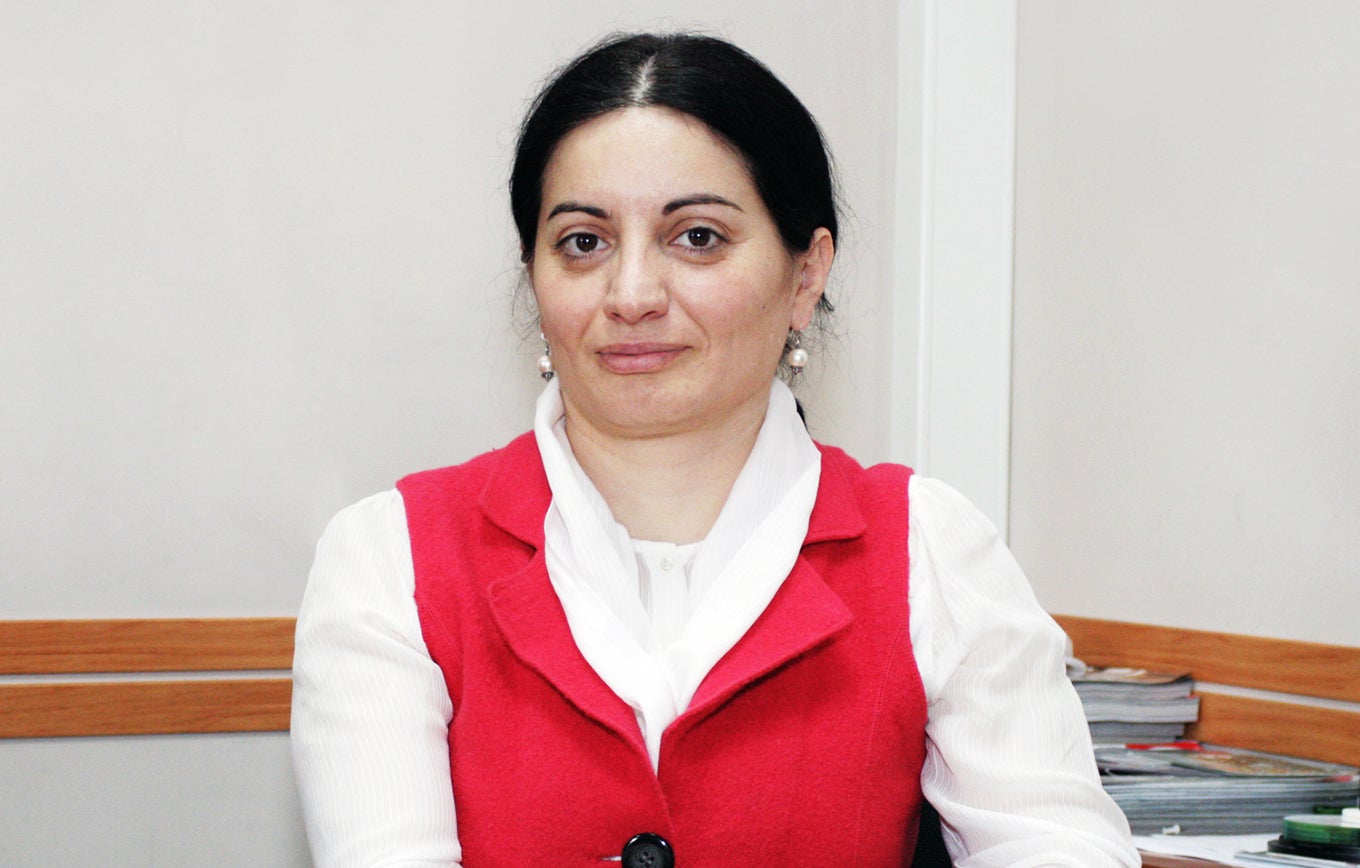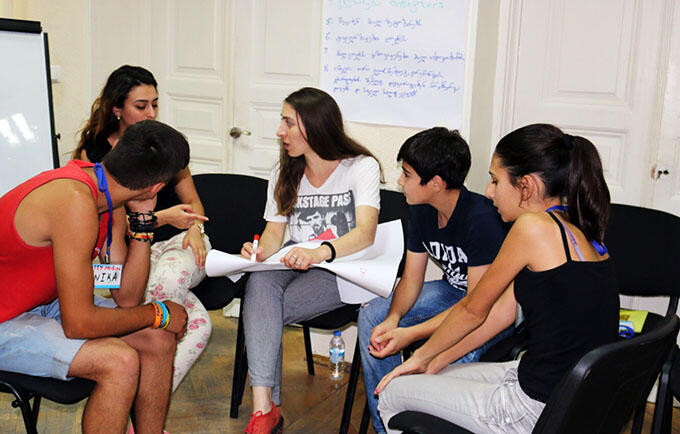TBILISI, Georgia — Like many other girls from rural villages in Georgia, Elene* didn’t learn much about her reproductive health as an adolescent. The only topic her mother discussed with her was menstruation. Before she married at age 16, Elene had never visited a gynaecologist, and her husband was the first person to tell her about contraception.
“I would type ‘sex’ or something like that into Google and read some information. Once I tried to watch a programme on TV about AIDS and my father turned it off, saying it was not appropriate for me,” says Elene, now 18, and from the Kaspi region in central Georgia. “When my husband and I were dating, I was always afraid of getting pregnant even though we did not have sexual relations before marriage. If I had consulted a gynaecologist, the entire village would have learned about it and talked about me.”
According to the most recent Reproductive Health Survey in Georgia, carried out in 2010 with support from UNFPA, USAID and UNICEF, awareness about reproductive health among the country’s rural population is much lower than in urban areas. The study surveyed more than 6,000 women aged 15 to 44 in all regions of Georgia and in the capital city of Tbilisi. It showed that the lack of information and access to quality services, especially for adolescents and youth, leads to lower usage rates of modern contraceptives and higher rates of early marriage, adolescent pregnancy and abortion.
“There is a visible inequality not only between rural and urban areas in general, but also among ethnic groups,” says Lela Bakradze, Assistant Representative of UNFPA in Georgia.
‘It was seen as shameful to talk about these things’
Zarifa*, 18, is from an Azeri community in Marneuli, in southern Georgia, where she says early marriage is common, but talking about reproductive health issues is not. “My classmates and I never spoke about these topics; it was seen as shameful, even a perversion, to talk about these taboo things,” says Zarifa, now a first-year university student in Tbilisi. “Girls feel free to talk about these issues with their mothers only after getting married. They are hardly aware when they start their new lives and only ask their mothers for help after they get into some kind of trouble.”
Zarifa was lucky compared to some of her peers, however. She was able to participate in a training where she learned about the risks of early marriage and unplanned pregnancies, how to use modern contraceptive methods, and the need for regular visits to the gynaecologist. She also had a teacher who inspired the majority of the girls in her class to attend university.
“Now most of the girls in my village have a dream to study instead of getting married,” Zarifa says.
‘You can’t really understand what is true and what is not online’
“The education and healthcare provided to adolescents, as well as the opportunities for development, are what determine the kind of young generation this country will get. This is a very important issue of human capital,” says UNFPA’s Bakradze.
But comprehensive sexuality education is still lacking in Georgia, leaving many young people to seek out sources on their own, including information on the Internet, which can be biased, inaccurate and incomplete.
“You can’t really understand what is true and what is not online – what to trust and how to double-check it,” says Mariam, 16, from Gurjaani municipality in eastern Georgia.
Only 1.5 per cent of youth in Georgia between the ages of 15 and 29 were able to correctly answer all questions posed about sexually transmitted infections (STIs) in the National Youth Survey carried out by UNICEF in 2014.

Dr. Lela Shengelia of Georgia’s National Centre for Disease Control and Public Health.
“A very big portion of the youth population is hardly even aware that sexual intercourse may result in pregnancy,” says Lela Shengelia, head of the Division of Maternal and Child Health at Georgia’s National Centre for Disease Control and Public Health.
As a result, the number of unplanned pregnancies among young people is high. Young women aged 15 to 29 account for almost half of the registered abortions (47.7 per cent) performed in Georgia, according to figures tracked by the National Centre for Disease Control and Public Health. Among all women who responded to the 2010 Reproductive Health Survey, 51 per cent of those who had undergone abortions said they did so because they did not want to have another child, while 20 per cent cited difficult socioeconomic conditions. Compared to their urban counterparts, rural women more frequently reported having an abortion to limit the number of children in their family.
High rates of sexually transmitted infections (STIs) and complications related to the termination of unwanted pregnancies contribute to high levels of secondary infertility in Georgia, making it difficult for some women to have children when they are ready.
“Making information on reproductive health accessible is essential to securing people’s right to plan when and how many children to have,” says UNFPA’s Bakradze.
Youth-friendly health services lacking
But even when information is available, stigma and lack of access to needed services still keep many Georgians – especially young people – from enjoying full sexual and reproductive health and rights. While a large majority of young people (85.9 per cent) believe they are mostly well-informed about condoms and the protection they provide from STIs and unwanted pregnancies, for example, only 47.4 per cent of youth say that they actually know how to use these modern contraceptives.
Though the law in Georgia grants adolescents and youth the right to obtain sexual and reproductive health (SRH) services without the consent of their parent or a guardian, many young people are not able to enjoy this right, according to health official Shengelia. Youth-friendly sexual and reproductive health services are not widely available in Georgia, and there are no social support systems to eliminate the stigma and discrimination associated with SRH issues.
This is especially a problem for women in rural areas, says Shengelia: “People are more sensitive in the villages, and everything women do is more visible [to their neighbours].”
Integrating healthy lifestyles into school curricula
“Unless we change the educational system, the results will be minimal,” she adds. “Restoring the role of school doctors is just one step that needs to be taken. We have trained them on issues of adolescent and youth reproductive health, but there is still a long way to go before they establish regular interactions where they can talk with adolescents about sexual life or contraceptives”.
“The state has a responsibility to educate,” agrees UNFPA’s Bakradze. “But if the information provided does not cause behavioural changes, youth will remain unprotected.”
Awareness-raising campaigns must become integrated and sustainable so that the information flow to youth, especially in rural areas, is not sporadic, says Bakradze. She added that UNFPA and the Ministry of Education have signed an agreement under which UNFPA will support the ministry in integrating issues related to reproductive health and healthy lifestyles into school curricula. The collaboration will also cover training of teachers and school doctors. To complement the changes to formal education, UNFPA will continue supporting informal interventions for adolescents and youth, including trainings, seminars, youth festivals, youth camps and peer education.
* Name changed to protect identity.
The original version of this article was written by Eka Kevanishvili and published by Radio Liberty. This version has been published by UNFPA as part of the regional launch of The State of World Population 2017.


